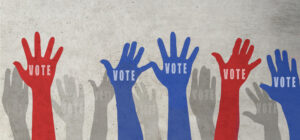It can be everywhere. We are talking about election coverage, and whatever perspective you may have for the next election, one thing is for certain, it can be overwhelming to watch the process.
Candidates are asking for money, politicians are mudslinging on social media, and divisive comments may be splitting you from friends and family.
When you need a support system the most, you may have to reflect on the people in your life and how their beliefs no longer match your values.

Read More: “Common Questions About Anxiety Answered”
It is no wonder that upcoming elections can bring more than anticipation, they can actually be anxiety inducing or cause anxiousness leading to election-related anxiety which can have great impact on your overall well-being according to some professionals.
According to the American Psychiatric Association, anxiety is up 43% in Americans compared to last year, and the election is a major factor in the increased stress.
According to a recent article by NPR, “in a poll by the American Psychiatric Association, nearly three-quarters (73%) of respondents said they’re feeling anxious about the election. Another poll by Myriad Genetics found that nearly 40% said they are feeling anxious and/or depressed about the election season, and a similar share said they are “checked out” by the amount of news and social media attention on politics and the upcoming election.”
So, we know that you may feel anxiety around election years, but what is election anxiety?
Understanding Election Anxiety
Whenever a presidential election is approaching, people tend to feel more stressed out and worry about the impact of the results on their daily life.
This can lead to an increase in anxiety symptoms related to the election, anticipation of what will come, fear of the impact the election results will have on you, and staying vigilant with the constant news and social media coverage.
All of these can be a reason for more anxiety during election years.
Of course, anxiety can be felt throughout the year, and there seems to be an uptick during election years according to Dr. Ayman Fanous, Chair of the Psychiatry Department at University of Arizona’s College of Medicine.
Dr. Fanous declared that election anxiety is on the rise demonstrated by several factors like increased prescriptions for anti-anxiety and biological studies showing an influx of cortisol, the stress hormone, in bodies around election time.
Anxiety can show up in different ways within the body, mind, and heart. According to Dr. Fanous, excessive worry, irritability, fidgeting, restlessness, problems with your GI tract, sleeplessness, and muscle tension can all be signs of election anxiety.
The Impact of Election Anxiety on Mental Health
The physical symptoms of election anxiety can be debilitating, and what does election anxiety do to your mental health?
Election anxiety can cause rifts in households and families. Sometimes, a family can be the biggest source of support, and the separation can take a toll.

Read More: “5 Quick Tips To Calm Anxiety Fast”
Rather than relying on a loved one to help get you through a difficult time, you may have to reach out to different networks when they are available to you.
You may become overwhelmed and have limited functioning when it comes to your workplace or social obligations.
Election anxiety can create loneliness, which can lead to long-term effects on your mental health including sleeplessness, depression, anxiety, and low self-esteem according to the American Psychological Association.
When you are isolated, it can also impair your cognitive and executive functioning, decreasing your ability to complete tasks at work as well as at home.
According to Denver Metro Counseling therapist, Julie Reichenberger, “the embodied experience of anxiety related to elections plays a significant toll on one’s mental health. When those who experience real anxiety related to the election think about the election, see or hear information coming through on social media and other news outlets, or overhear conversations their body tends to tense up.
They may experience an increased heart rate, notice a buzzing or energy in different areas of their body, they may spiral into worry, and may sense a real fear of not being safe.
This increases cortisol, the stress hormone, and can cause physical and mental distress.”
Strategies For Managing Election Anxiety
We know how election anxiety can become a problem in our lives, so what are some strategies to manage it?
According to the American Psychological Association, it is possible to manage your election anxiety, and here are a few strategies:
· Limiting exposure to news and social media coverage
· Identifying that the uncertainty is fueling symptoms
· Staying connecting with a social network
· Doing activities that are meaningful for you
· Finding ways to cope in a healthy way like movement
You will likely feel some impact of the election on your daily life no matter your perspective, so it is not about stuffing your feelings down or not letting yourself have emotions.
It is about providing a safe space to yourself.
This can also mean that you are staying informed without becoming overwhelmed by putting parameters and boundaries around what you choose to watch, listen to, and ingest within the scope of election coverage.
Sometimes, this means that you need professional support. That is okay too.
Focus on what you can control.

Read More: “5 Ways to Mange Election Related Stress”
According to licensed Denver therapist, Molly Ward, “There are always going to be things that are out of our control, so our job is to focus on what we can control, so that we can manage our mental health and wellbeing.
You can’t control an election, but you can control whether you vote and who you vote for.
You can’t speed up time to hear the results quicker, but you can practice coping skills that keep you present and bring you joy until you do find out.
You can’t control what other people say or believe, but you can control your response to others to protect your mental health.
You can’t control the political climate, but you can make sure to get enough sleep, move your body, and eat a balanced diet so that you have a better chance of managing what comes your way.
Shifting our focus to what’s within our reach and abilities is a crucial piece in remembering that we are not powerless.”
Utilizing Professional Help And Resources to Help with Election Anxiety
Reichenberger continues, “finding a way to process and move through emotions that come up around election anxiety with a therapist can help with creating some protectors around information overload.
When we process our distress and fear with friends, it can be very supportive, and can increase the collective felt sense of fear.
Learning ways to manage the anxiety, even on a short-term basis with a therapist or other impartial support can be a grounding experience.”
At Denver Metro Counseling, we have therapists who specialize in anxiety whether it is something that is felt every day or especially during the election. Our trauma-informed, client centered approaches helps our therapists to provide care and compassion to clients while putting coping strategies in place.
Election years can bring up more emotions, feelings, and stress than usual. Connecting with a professional can help you to take perspective and come out on the other side when you start to feel like you are by yourself.
Our therapists offer professional support for anxiety, depression, and chronic illness and provide support to young adults, teens, family therapy, and individual therapy.
There is a network available, and when you are ready, we can help. Contact us today to get started.
Written by: Randi Thackeray, MA
Clinically Reviewed and Edited by Denver therapist: Julie Reichenberger, MA, LPC, ACS, NCC



